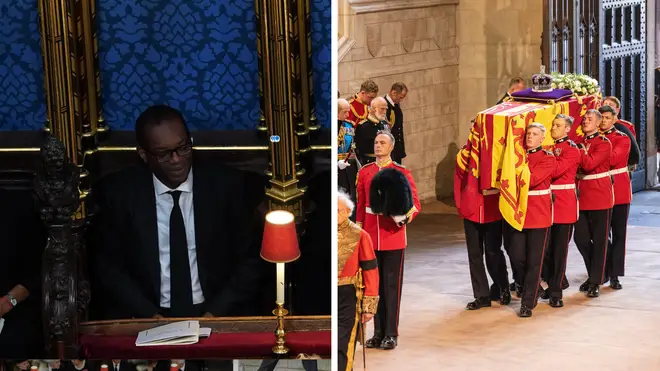
Ali Miraj 12pm - 3pm
4 October 2022, 15:42 | Updated: 14 October 2022, 13:25

The Chancellor Kwasi Kwarteng has blamed the “pressure” of the Queen’s death for mistakes in the mini-budget which left the Conservative party in crisis.
Speaking to GB News, he said: “We had a nation in mourning and then, literally, four days after the funeral we had the mini-budget,” the chancellor said.
“It was a high speed, high pressure environment and we could, as David Cameron used to say, have prepared the pitch a bit better.”
The Chancellor caused further confusion over his next financial statement, saying: “It’s going to be 23 November,” – despite the Treasury briefing it has been brought forward to October.
Mr Kwarteng also said the scrapping of the controversial 45p tax rate for top earners has merely been “postponed”, before correcting himself to say: “We have decided not to proceed with it.”
Read more: Liz Truss and Kwasi Kwarteng U-turn on scrapping 45p tax rate
His position is in jeopardy after the announcement triggered a run on the pound and caused market panic.
But when asked what he could have done differently, Mr Kwarteng said: “It was a very quick time that we did it.”
“You have got to remember the context. What was extraordinary about that month was we had a new government and also we had the sad passing of her majesty Queen Elizabeth II.”
The chancellor also admitted, following denial from ministers, that the fiscal statement was partly to blame for the cost of state borrowing soaring and the pound crashing.
“There was a global picture, but I don’t deny that there was some market reaction to the budget because it was a bold offer,” he said.
Mr Kwarteng denied the measures were “extreme”, and argued that despite the political and economic damage, the mini budget had been a success on one level.
“We have shifted the debate and I’m hopeful that, over the next few weeks, things will stabilise,” he told the new channel.
“Nobody is arguing that we should put up Corporation Tax,” he claimed, although opposition parties have attacked scrapping the plan to lift the rate to 25 per cent.
His fiscal event provoked turmoil in the City, a warning from the IMF, and resulted the Bank of England stepping in with a £65 billion bond-buying programme to stem a market rout.